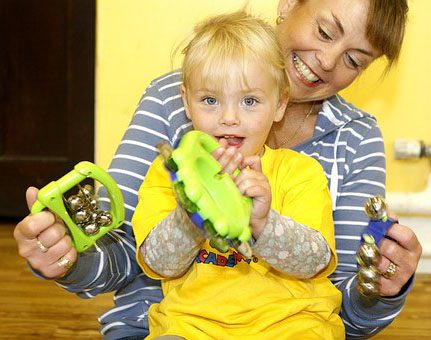Many different words have been used to capture this aspect of healthy parenting: empathic, responsive, attuned, compassionate, sensitive, loving, synchronous, and so on. These words all point to the parent being sensitively aware of the needs, desires, feelings, interests, ideas, and abilities of their infants and children. It involves us listening to what our children say, but also being attuned to their body language, their rhythms, their sounds, their cries, and other ways in which they show us what they are experiencing.
 Crucially, responsive presence requires that we convey to our children that we understand their experience. We do this through our words and through our voice tone. No matter what our children are expressing to us, we need to make conveying our understanding our go-to response.
Crucially, responsive presence requires that we convey to our children that we understand their experience. We do this through our words and through our voice tone. No matter what our children are expressing to us, we need to make conveying our understanding our go-to response.
Child: “Darren took my truck and hurt my hand!”
Parent: “Oh, Darren grabbed your toy and it really hurt, huh?”
Child: “We had seven questions in class and I got them all right!”
Parent: “Seven questions! And you’re so happy you got all of them.”
In my work with parents, acknowledging their child’s experience in words almost always has the greatest positive impact. Almost regardless of the situation or problem they are facing, when parents learn to begin by acknowledging their child’s experience, most of the work is done. Their relationship is immediately moved in the direction of more secure attachment, and any power struggle is softened.
Some quick points:
-It is great if we can be accurate in understanding our children’s experience, but the most important thing is that we are trying to understand – more about this.
-Anything our child feels, thinks, or experiences is always okay. You may not want them to do certain things and you may see things differently – more about this.
Let’s consider a few common situations:
Your child is doing something that you don’t want her to.
Your child is lounging on the antique couch your mother gave you, pulling out loose threads from the fabric: “Jeannie, I imagine it’s fun to pull at the threads,” (the acknowledgement part); “I don’t want you damaging the fabric on Grandma’s couch.”
Your child is heading out the door to play with a friend but has not done his homework as he had agreed: “Scott, I realize that you’re looking forward to playing with Mark. I’m wondering about your homework?”
Your child is upset or angry.
Child: “Stupid teacher thinks we have all night to do homework!”
Parent: “She gave you a lot to do, huh? Boy, that must feel like a big drag.”
Child: “I hate you! You always ruin my fun!”
Parent: “I get you’re really mad at me, and it seems like I never let you have any fun.”
Your child wants something that he cannot have.
Child: “Please, please, please can I have the Robotron 5000? If you get it for me, I’ll never ask for anything ever again!”
Parent: “Wow, you must really, really want that Robotron. It seems like an awesome toy” (the acknowledgement part); “I sure wish I could buy it for you, Jared. It costs over $100 and we don’t have any extra money this month” (the limit part, discussed below).
Child: (becoming tearful) “But Ken and Simba both have one and I can’t play the game if I don’t get one, too!”
Parent: “Oh sweetie, I can see how disappointed you are. It’s so hard not to be able to join in with your friends.”
You want to create more closeness with your child.
No matter what our children are saying or doing, we can begin to enter into their worlds by expressing understanding of their experience. With younger children we can acknowledge what we observe and hear in their play. Some examples:
Parent: “So that dolly is the mommy and that dolly is the baby”
Parent: “You want that stick really deep into the ground, eh?”:
Parent: “Wow, you got six shots in a row!”
With older children, the situations are different but the principle of acknowledging their experience is the same.
Child: “Sophia is such a cow. She borrowed Angela’s jacket and now she won’t give it back.”
Parent: “It really bugs you that she’s treating Angela that way, huh?”
Child: (whining) “I feel too tired to go to school today.”
Parent: “You’re really having a tough time getting going, eh?”